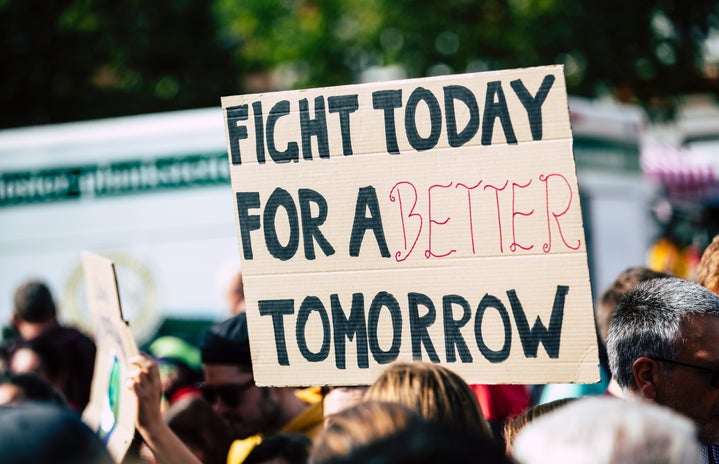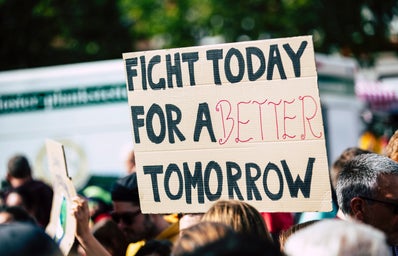Throughout the last couple of months, it has been difficult to ignore the vast amount of social media posts calling for boycotts of various companies. From Starbucks to Zara to Kellogg’s, TikTok, specifically, is full of a variety of videos bringing attention to these movements. Despite the noise on social media, many people remain ignorant to boycotts largely because they do not understand their purpose. It is very easy and even logical at times to assume your measly purchase at Starbucks, or lack thereof, is not actually going to help anyone. Many assume that these large companies won’t notice whether they purchase a $7 latte every day, so what is the point? This perspective is understandable. I used to feel this way about boycotts too, so do not feel like you are alone. That being said, I have come to more fully understand the power that exists in boycotting, allowing your voice to be heard and making a collective change for a cause you care about. If you are on the fence about giving up your McDonalds or Starbucks, I hope to convince you otherwise through this article.
If you pay any attention to news, it seems like every day there is a new story about another group of people who are suffering in some way, both in the US and internationally. It is so easy to become desensitized to all the horrible information we take in every day. Very little energy is required to say, “there is nothing I can do about it” or “I feel bad, but I am too insignificant to make a change.” This mindset is exactly the type of mindset the system wants us to adopt. If we feel powerless, we won’t seek ways to make change because we feel we will never have the power to do so. But this is not true. We do have power, the power in numbers and the power in privilege, and we should learn to leverage this power.
You might actually be right in thinking that as an individual you can do very little to change the world. But if you choose to use your voice, engage with your peers, and challenge those in power, then suddenly the individuality that once made you weak becomes tied to hundreds if not thousands of other individuals who can use their collective voices to make a change. In fact, it only takes 3.5% of the population to make significant change. So maybe one person sitting in a void can’t do anything, I’ll give you that. But if one person does something as simple as posting on social media or engaging their peers in challenging conversations, one person can become the 3.5% that is needed to actually do something.
I hope I have at least convinced you that collective action can and does work. However, if you still don’t believe boycotts are an effective form of this collective action, then keep reading. Originating as far back as the 1800s in Ireland, boycotts have been a popular tool to initiate social change. Some of the biggest political and social movements in history have included boycotts as an integral part to their success. Undoubtedly you have heard of the Montgomery Bus Boycotts as a part of the civil rights movement in the 1950s and 1960s. For over a year, citizens in Montgomery, Alabama refused to use the public bus system as a result of Rosa Parks being arrested and finally got what they wanted when the buses were integrated. Looking back, I think everyone agrees that they would have participated in this boycott. It seems like common sense to protest something that is so adamantly against your morals. This is obvious right? Then why is it not as obvious to boycott companies today when they support things you don’t believe in? Well hindsight is always 20/20 and it is a lot easier to say you would do something than actually do it. Boycotting can be hard. Refusing to take the bus for example could result in hours spent walking. The key is doing something hard because you believe in change, and you want to be a part of that change.
Obviously, boycotting is not easy. It also is not fast. Like many things in our world, good things come with time. The Montgomery Bus Boycott lasted for over a year. While this seems long, it doesn’t even come close to the Anti-Apartheid Boycott, which protested the apartheid in South Africa, which lasted for 35 years. For three and a half decades, a significant group of people refused to buy certain goods that were produced in South Africa. While the apartheid in South Africa did not end directly because of this boycott, it certainly played a role in bringing justice to the citizens in South Africa. Change will not happen in a day, so boycotts cannot last for only a day. It may be hard to go without some of your favorite brands for so long, but is it not worth it to protect another group of people who likely have it much worse?
Thus far, I have told you that boycotts are hard, they take a long time and are rarely the main cause of bringing about change. Boycotts may now seem even less appealing than they were before you started reading, but please stay with me. Boycotts are not meant to be the sole force for social change. They are meant to be one piece in a larger picture that gets things done. Additionally, boycotts do not only try to pressure individual companies, but they cause noise, arguably one of the most important ways to affect social movement. When I first mentioned the Starbucks boycott, you probably knew exactly what I was referring to and roughly why the company is boycotted. Boycotts bring attention to social and political movements. Now when you see a Starbucks cup, it may be difficult to not think of the ongoing genocide in Gaza. This is very powerful to keep these ideas fresh in people’s minds. It works against our fast-paced society based on the internet and trends by not allowing things to fall out of popularity. So long as the people do not give up, the message will continue to be spread.
If nothing has convinced you yet, let me give one last argument. We live in a capitalist society, where power lies in the person or company with the most money. Often, these people and companies are very corrupt and support things that would go against many people’s moral compass. Even if others stop boycotting and the company’s profits don’t experience any decrease, at least you can feel good about what you are spending your money on. You do not have to give your hard-earned money to companies that are not going to use it in the way you want. If you do not think boycotting works on a group scale, participating in your own boycotts to feel good about who you give your money to can be all the reward you need.


